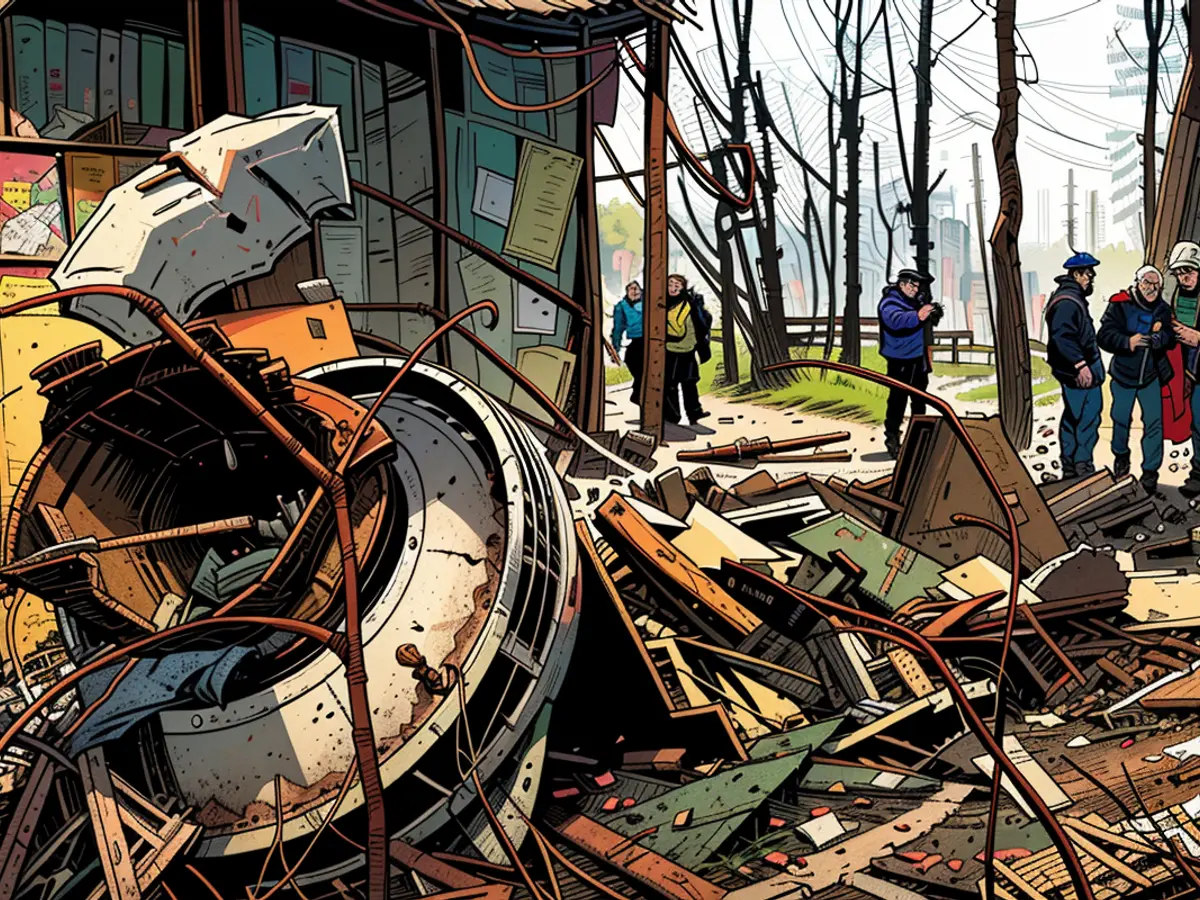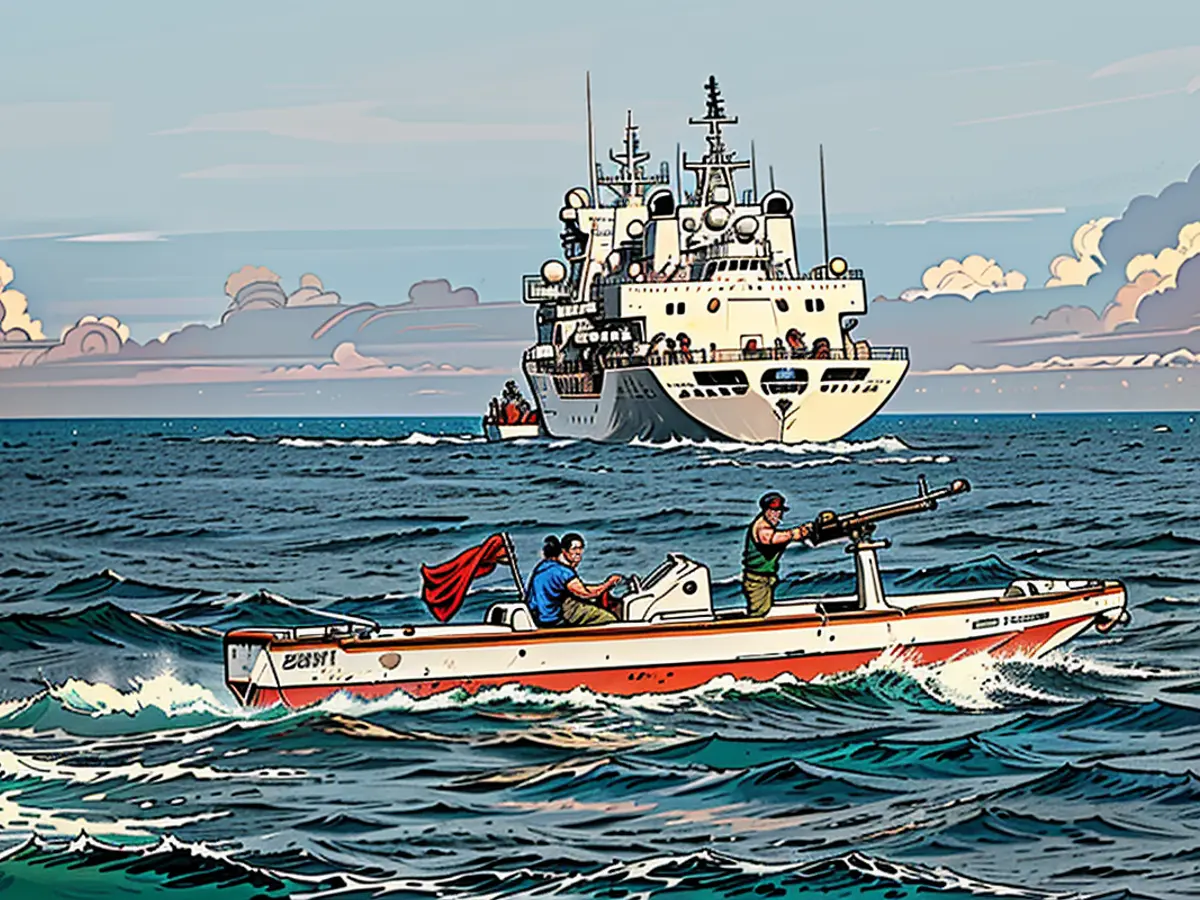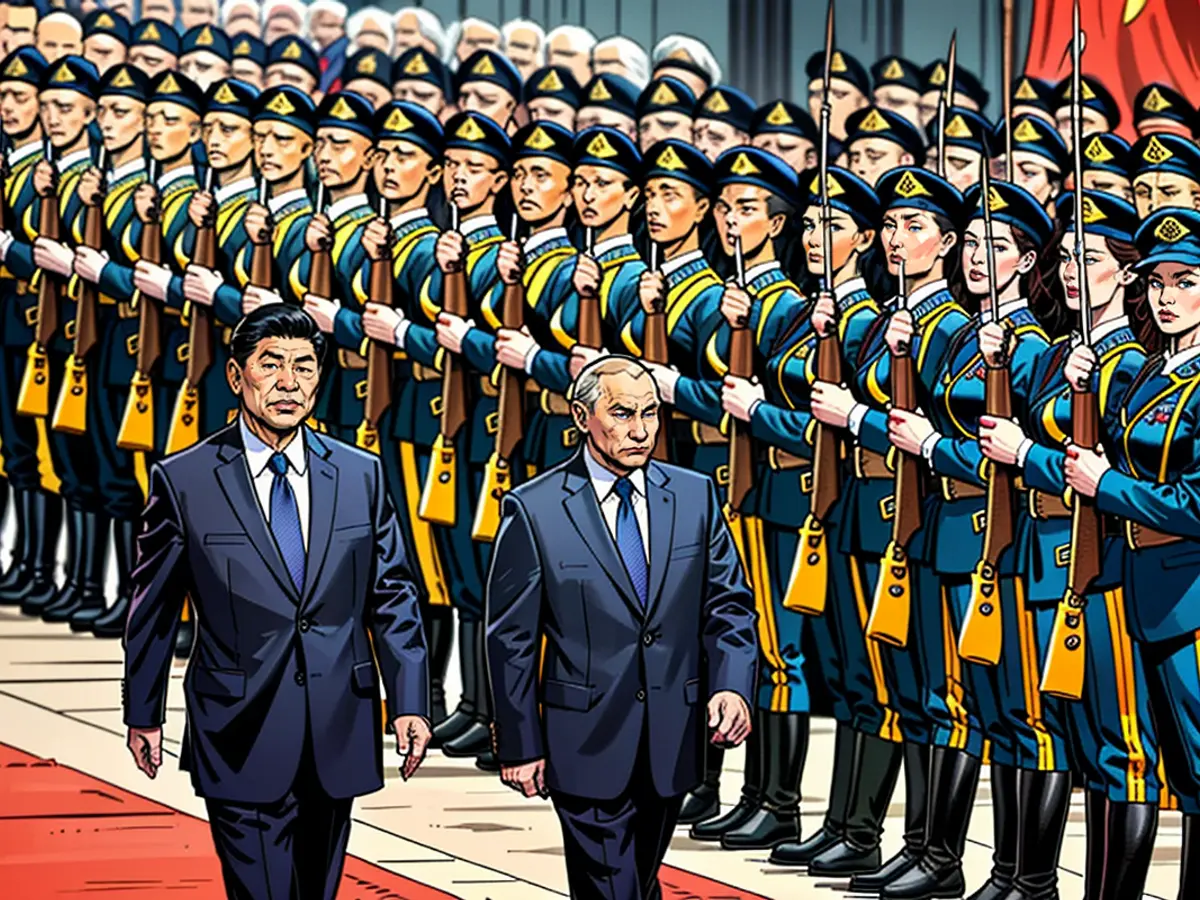With North Korea, Iran, and China backing Russia's military conflict, is a "new tripartite alliance" materializing?
There's escalating worry from the United States and its allies about the growing collaboration between countries antagonistic to the West. This allegedly dangerous union is creating a broader, more urgent security threat, with temporary alliances transforming into more overt military partnerships.
Iranian drones have been a part of Moscow's assault on Ukraine, and recently, the US accused Iran of shipping short-range ballistic missiles to Ukraine's adversary.
China, on the other hand, has been implicated in powering Russia's war effort with substantial amounts of dual-use goods like microelectronics and machine tools. Recently, the US penalized two Chinese companies for providing complete weapon systems. All three countries deny providing such support.
This emerging alliance earned the label of an "axis of growing malign partnerships" from a Congress-backed group evaluating US defense strategy during the summer.
There's fear that a shared hatred towards the US is pushing these countries to work together, amplifying the danger that any one of them poses to the US or its allies, not just in a single region but possibly in various parts of the world simultaneously.
US Defense Secretary Lloyd Austin claimed that North Korea, if it becomes a co-belligerent, aims to participate in Russia's war, with consequences not only in Europe but also in the Indo-Pacific region.
‘Survival strategy-driven’
Decades after the Axis powers and the strong anti-West coalition of the Cold War era, and years after George W. Bush's labeling of US enemies as an "axis of evil," there's a perception that a new, perilous alignment might be emerging, fueled by Putin's war.
This union would combine two long-time nuclear-armed countries, a state believed to have constructed a stockpile of illegal nuclear weapons (North Korea), and Iran, which the US claims could quickly assemble such a weapon under the right circumstances.
North Korea's military partnership with Russia connects the ongoing, heated conflict in Europe to an especially tense period in the Cold War on the Korean Peninsula, as Kim Jong Un has intensified his threats towards the South, with which it remains technically at war.
Following intelligence about North Korean deployment to Russia, South Korea hinted at considering supplying weapons to Ukraine, where the US ally has yet to directly provide arms.
For North Korea, where Kim recently called to increase its illicit nuclear weapons program, sending millions of artillery rounds, short-range ballistic missiles, and troops to Russia appears to carry little risk. In exchange, cash-strapped and internationally isolated Pyongyang likely received food and other necessities, and potentially support in developing its space capabilities, which could aid its sanctioned missile program.
The importance of drone warfare in Ukraine has also seen Russia turn to Iran for acquisitions – strengthening a security alignment that started in 2015 during the war in Syria when both supported the regime of Bashar al-Assad.
Suppling Russia with weapons is believed to benefit Iran's defense industry, while its ties with Beijing and Moscow offer it diplomatic cover.
Chinese leader Xi Jinping, who proclaimed a "no limits" partnership with Putin weeks before his invasion, has maintained neutrality in the conflict and mostly steered Chinese firms away from providing direct lethal aid. However, China has filled substantial gaps in Russian demand by supplying products deemed dual-use, and it has benefited from Russia's discounted energy. Beijing defends its "normal trade" with Russia. China has also expanded joint military drills and diplomatic ties with a country it views as a key partner in pushing back against the West in international fora.
But despite each nation's motivations for collaborating with the others, especially within the context of Russia's war, clear limitations exist in any broader coordination, mutual trust, and even interest in working together – at least for now, observers say.
“This is a set of bilateral relationships driven by each country’s survival strategy, or what’s on the menu for geopolitics and what’s the crisis of the day or the decade that they are dealing with,” said Alex Gabuev, director of the Carnegie Russia Eurasia Center in Berlin.
“These are authoritarian regimes … and they all see the US as a common adversary. That’s the glue that keeps them together, but whether we can talk about a degree of coordination (between all four) … I think we are very far from that,” he said.
This raises the question of whether these current alignments can persist beyond the war in Ukraine and evolve into outright coordination between all four nations.
The China factor

A significant factor in determining how any further alignment develops is China, observers argue – the most powerful player in this grouping, Russia’s primary trade partner, and the country viewed by the US as its prime adversary.
As its conflicts with the US have intensified, China has stepped up efforts to challenge US global leadership and create an international order that supports China and other autocracies. Russia's role in this endeavor became evident this week in its southwestern city of Kazan, where Xi and Putin cited their commitment to building a “fairer” world on the sidelines of a summit of the BRICS group, whose membership they'd jointly worked to increase this year.
Iran and these two entities have managed to include Iran in their diplomatic circle and have generally supported Tehran in the Middle East's conflicts, where Iran's proxies are clashing with Israel. Since 2019, China, Russia, and Iran have conducted four joint naval exercises. China is Iran's leading energy buyer by a large margin.
China, however, no longer sees Iran as its main priority in Middle Eastern policy, as it strengthens relationships with wealthier Gulf countries, according to Jean-Loup Samaan, a senior research fellow at the National University of Singapore's Middle East Institute.
China also carefully manages its dealings with North Korea, which is heavily reliant on China economically and politically. Chinese leaders see the growing Kim-Putin alignment and the potential for a stronger North Korea causing issues and drawing more US attention to the region with caution.
In response to inquiries about North Korean troops moving into Russia during a routine press conference, China's foreign ministry claimed it had no knowledge of the situation.
China is keen to distance itself from appearing to support these partnerships too forcefully and harm its efforts to present itself as a responsible global leader.
As Tong Zhao, a senior fellow at the Carnegie Endowment for International Peace, put it, China seeks to distance itself from being perceived as a trilateral alliance with Russia and North Korea while also having more options and preferring to work with numerous countries to compete with the West.
From the Western perspective, China's unwillingness to sever economic ties with North Korea, which defies UN sanctions, and Russia, which has threatened to use nuclear weapons in Ukraine, appears to be an endorsement of these regimes.
The report from the Commission on the National Defense Strategy, an independent group appointed by Congress to evaluate US defense strategy, stated that China and Russia's partnership has expanded to include economic and military partnerships with Iran and North Korea.
This new alliance of nations opposed to US interests may present a "real risk" or possibly a "likelihood" that conflicts anywhere will become multi-theater or global wars, as claimed by the commission.
China has consistently maintained that their relationship with Russia is non-aligned, non-confrontational, and non-targeting of any third party.
NATO has also increased its relations with US allies and partners in the Asia-Pacific region, with defense ministers from Australia, Japan, New Zealand, and South Korea participating in a meeting recently for the first time.
Russia's weapons partnerships could also provide Iran and North Korea with the chance to obtain and manufacture Moscow's sophisticated weapons technologies and potentially distribute them worldwide, as Carnegie's Zhao pointed out.
The current situation also raises the possibility of future conflicts involving China, and China being a central player, leading to coordination between the four nations, according to some analysts.
However, this "axis" or future is not a given, as these relationships remain opportunistic rather than based on deep ideological alignment or trust. Some experts also believe that "moderate behavior" could be incentivized from China to reduce this potential.
But, as the current situation stands, the US could face a future conflict involving multiple of these countries, said Sydney Seiler, a senior adviser at the Center for Strategic and International Studies in Washington, D.C.
CNN’s Brad Lendon, Yoonjung Seo, and Mike Valerio contributed to this report.
This new alignment between China, Russia, Iran, and potentially North Korea, as labeled by a Congress-backed group, could pose a global security threat, extending beyond a single region. China's role in supplying Russia with necessary goods for its war effort has been significant, while North Korea's military partnership with Russia connects the conflicts in Europe and the Korean Peninsula.
The perceived survival strategy of these authoritarian regimes pushing against the US serves as the glue binding this alliance together. Despite their collaborations, the bilateral relationships among these countries are driven by individual survival strategies rather than a united front.
This raises questions about the longevity and coordination of these alignments beyond the ongoing conflict in Ukraine. China, as the most powerful player and key trade partner for both Russia and North Korea, plays a significant role in shaping the future of this alliance.








